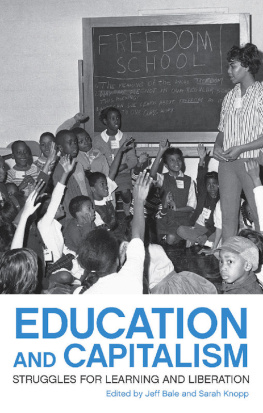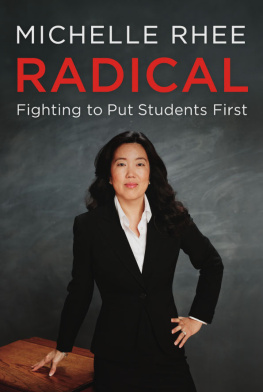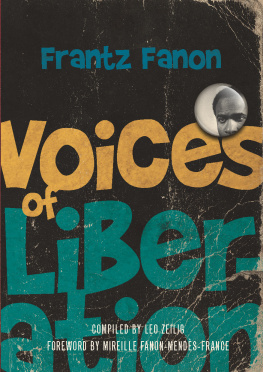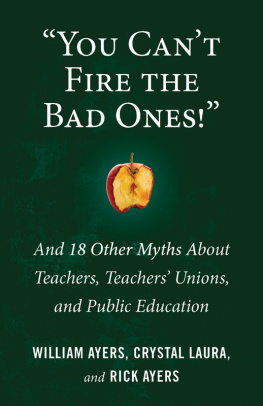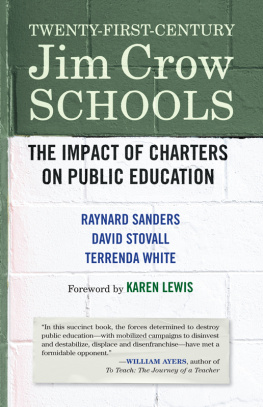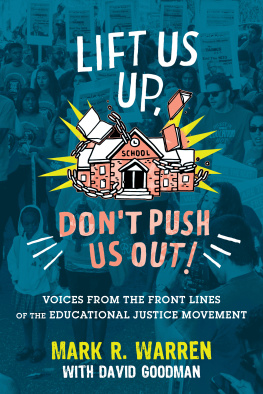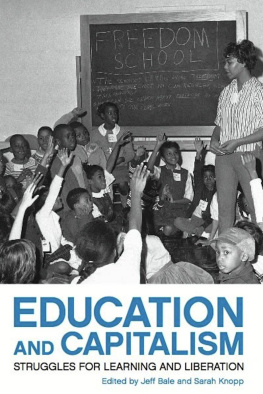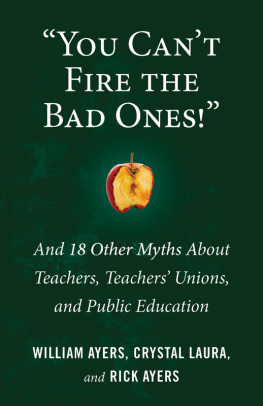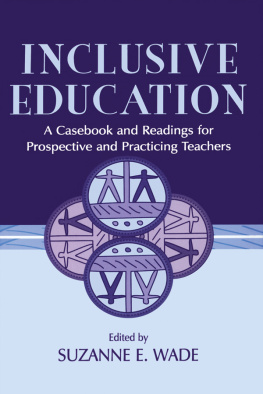Contents
Adam Sanchez Interviews Bill Bigelow
A Defense of Public Education and an Action Plan for Change
Sarah Knopp and Jeff Bale
Schools, Marxism, and Liberation
Sarah Knopp
The Struggle for Black Education
Brian Jones
The Indian Boarding Schools
Michele Bollinger
Linguistic Justice at School
Jeff Bale
Obamas Neoliberal Agenda for Public Education
Gillian Russom
Students, Parents, and Teachers Nationwide Protest Gutting of Public Education
Rose Aguilar
Teachers Unions and Social Justice
Jesse Hagopian and John T. Green
The Madison Protests
Dan Trocolli and Sarah Knopp
Teachers Struggle in Oaxaca, Mexico
Jessie Muldoon
Pedagogy and Revolution: Reading Freire in Context
Adrienne Johnstone and Elizabeth Terzakis
The Freedom Schools
Keeanga-Yamahtta Taylor
Literacy and Revolution
Megan Behrent
Education and Capitalism
Struggles for Learning and Liberation
Copyright 2012 by Jeff Bale and Sarah Knopp
Published in 2012 by
Haymarket Books
PO Box 180165
Chicago, IL 60618
www.haymarketbooks.org
773-583-7884
ISBN: 978-1-60846-147-9
Trade distribution: In the US, Consortium Book Sales and Distribution, www.cbsd.com In Canada, Publishers Group Canada, www.pgcbooks.ca In the UK, Turnaround Publisher Services, www.turnaround-uk.com In Australia, Palgrave Macmillan, www.palgravemacmillan.com.au All other countries, Publishers Group Worldwide, www.pgw.com
Cover design by Josh On. Cover image of children attending a Freedom School in an integrated public housing project in Cincinnati during a one-day boycott of city schools organized by the Congress for Racial Equality in 1964. Gene Smith, Associated Press Photo.
Published with the generous support of Lannan Foundation and the Wallace Global Fund.
Library of Congress cataloging-in-publication data is available.
10 9 8 7 6 5 4 3 2 1
Chapter 6
Pedagogy and Revolution: Reading Freire in Context
Adrienne Johnstone and Elizabeth Terzakis
Like the demands for bilingual education that emerged from the Chicano Power movement and the insistence on equal access to educational resources that came out of the civil rights movement, Paulo Freires prescriptions for critical pedagogy were informed by a broader battle for social justice. They were also, importantly, a product of his commitment not just to social reform but also to socialist revolution. Freire was a Marxist, and his conviction that the shortcomings of the educational system were inextricably tied to the inequality and injustices of the capitalist system is everywhere evident in Pedagogy of the Oppressed .
Unfortunately, and as has been noted in previous chapters, the gains of the movements of the sixties and seventies have been eroded, if not completely reversed, by forty years of neoliberal ideology and policy and a lack of coordinated grassroots struggle. This is as true in the realms of criminal justice and welfare as it is in education. But the degree to which a lack of experience of struggle has allowed the neoliberal dictate of individual responsibility to pervade society is particularly apparent in the way that Freires ideas have been stripped of both their historical context and their revolutionary theory. In the absence of collective struggle and without the underpinnings of Marxism, it is easy to see Pedagogy of the Oppressed as a set of principles and best practices for individual teachersguidelines for a revolution in one classroom.
This chapter aims to resituate and reclaim Pedagogy of the Oppressed as a specifically Marxist revolutionary text that requires educators to look beyond the classroom to achieve liberatory education. Such a rereading and representation of Freire is particularly important now, as the revolution-in-one-classroom understanding of Pedagogy is consistent with the neoliberal idea that the current crisis state of public education is caused by incompetent teachers and the corrupt unions that protect them. As social justice educators, we cannot afford to be pitted against each other, nor can we ignore our unions or allow them to be disbanded; we must use them to build the kind of collective action that makes truly liberatory pedagogy possible.
Roots
Paulo Freire was born in Recife, Brazil, in 1921. He worked briefly as a lawyer but soon turned to education, specifically to developing literacy programs for the Brazilian peasantry, which was widely disenfranchised due to a literacy requirement. When the reform government of Joo Goulart was ousted by a CIA-supported military coup in 1964, Freire, considered an international subversive trying to turn Brazil into a Bolshevik country, was immediately arrested and imprisoned for seventy days. Before he could be imprisoned again, or worse, he began a sixteen-year self-imposed exile.
During exile, he worked with the revolutionary nationalist leadership of Guinea-Bisseau and the World Council of Churches in Geneva, taught at Harvard, and built educational reform projects around the world. He returned to Brazil in 1980 and joined the Workers Party, or PT (according to its initials in Portuguese), as a founding member along with, among others, former Brazilian president Luiz Incio Lula da Silva. After the military dictatorship ended in 1984, the PT gained strength throughout Brazil. In 1989, the partys candidate won the mayoral race in So Paulo, and Freire was appointed secretary of education, a position from which he resigned in 1991. He is probably the best-known theorist of critical pedagogy in the world.
In Pedagogy of the Oppressed , his most widely read work, Freire presents a theory of education and social change, arguing that education is inseparable from the struggle for what he called the ontological vocation of humanitythe completion of ourselves as human beings. When the book was published in 1970, Freire believed that a complete transformation of society would be necessary in order for this vocation to be realized. Capitalismwhich is not organized to provide for, let alone encourage and develop, the overwhelming majority of the planets peopleprevents humanization. Consequently, it must be replaced by a system that allows for, as Marx put it, an association in which the free development of each is the condition for the free development of all.
Your Money and Your Life: Banking versus Problem-Posing Education
Pedagogy of the Oppressed includes an analysis of education under capitalism and a critique of what Freire describes as the banking concept of education. In banking education, teachers deposit knowledge in the empty vaults of students minds. The curriculum is either in the hands and mind of the teacher alone or determined at a distance from the classroom by administrators or school boards or some other organ of the state. Once the information has been deposited in the students brains, the only thing left to do is to ascertain how well they have memorized it, which is easily done through standardized tests, since what is important for the students to know has already been determined and is easily measurable. The banking concept forces on students an almost-total passivity and can easily render the teacher equally passive. Freire and Ira Shor speak at length in A Pedagogy for Liberation about how banking education works to produce glassy-eyed, checked-out students and droning, deadly boring instructors.
Underpinning Freires characterization of schools is a Marxist understanding of the statethe structure of laws, institutions, armed bodies, and prisonsthat orders our society. According to Marx, the state is not a neutral body evenhandedly mediating the relationship among the various social classes. Rather, it is a structure that is set up for the sole purpose of protecting and serving the interests of the ruling class. Chapter 1 describes in some detail the Marxist understanding of the dynamic relationship between the economic base and the political, social, and ideological superstructure that characterizes any class society, capitalism included. Freires concept of banking education is generally consistent with this idea. Under capitalismand Freire is quite clear about thisschools exist to socialize the next generation of workers in the values and interests of capital, and those of us committed to the liberation of ourselves and our students should never expect an initiative coming from the state to tend in any other direction.
Next page
